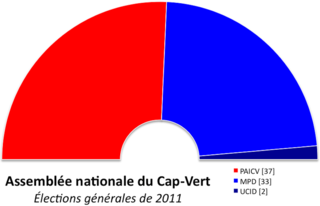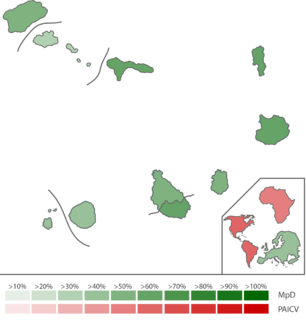
Politics of Cape Verde takes place in a framework of a semi-presidential representative democratic republic, whereby the Prime Minister of Cape Verde is the head of government and the President of the Republic of Cape Verde is the head of state, and of a multi-party system. Executive power is exercised by the President and the Government. Legislative power is vested in both the Government and the National Assembly. The Judiciary is independent of the executive and the legislature. The constitution first approved in 1980 and substantially revised in 1992 forms the basis of government organization. It declares that the government is the "organ that defines, leads, and executes the general internal and external policy of the country" and is responsible to the National Assembly.

The recorded history of Cape Verde begins with Portuguese discovery in 1456. Possible early references go back around 2000 years.

Pedro de Verona Rodrigues Pires was the President of Cape Verde from March 2001 to September 2011. Before becoming President, he was Prime Minister from 1975 to 1991.

The Movement for Democracy is a Christian democratic and liberal party in Cape Verde. Established in 1990, it was the ruling party from 1991 to 2001 and returned to power in the 2016 parliamentary election. Its members are nicknamed "os ventoinhas".

The Struggle Front for the National Independence of Guinea was a political movement in Guinea-Bissau. Founded by groups opposed to the Marxist doctrine of Amílcar Cabral and the African Party for the Independence of Guinea and Cape Verde (PAIGC), FLING played a minor role in the national liberation struggle against Portuguese colonial rule.
Carlos Alberto Wahnon de Carvalho Veiga is a Cape Verdean politician. He was Prime Minister of Cape Verde from April 4, 1991 to July 29, 2000.
The Labour and Solidarity Party is a political party in São Vicente, Cape Verde led by Gilson Alves.

The unicameral National Assembly is the legislative body of the Republic of Cape Verde.

Parliamentary elections were held in Cape Verde on 22 January 2006. The result was a victory for the ruling African Party for the Independence of Cape Verde (PAICV) run by José Maria Neves, which won 41 of the 72 seats in the National Assembly. Second was the Movement for Democracy (Mpd) and third was Democratic and Independent Cape Verdean Union (UCID) led by João Santos dos Luís.

The Radiotelevisão Caboverdiana is Cape Verde's first radio and television station broadcasting local programs from Cape Verde, Portugal and Brazil as well as the rest of the world especially France. It is a publicly owned company and enterprise and is located in the Capeverdean capital city of Praia, in the southern part in the middle of Achada Santo António RTC also has a few buildings, it also has offices in São Vicente, Sal, São Filipe on Fogo Island and Assomada in Santa Catarina. The building size is very small, only like local affiliates in North America as well as Latin America, Australia and Europe. The radio building is in the south on Rua 13 de Janeiro and the television station is in the north. Its current president is José Emanuel Tavares Moreira/

Parliamentary elections were held Cape Verde on 6 February 2011. The result was a victory for the ruling African Party for the Independence of Cape Verde (PAICV), led by Prime Minister Jose Maria Neves, which won 38 of the 72 seats in the National Assembly.

Cape Verde–Guinea Bissau relations refers to the bilateral relationship between the Republic of Cape Verde and the Republic of Guinea-Bissau. Cape Verde is an island country about 900 km north-west of Guinea-Bissau, a coastal West African country. Both were colonies of the Portuguese Empire and they campaigned together for independence with a plan for unification, but the countries separated after 1980.

Parliamentary elections were held in Cape Verde on 20 March 2016. The ruling African Party for the Independence of Cape Verde (PAICV), led by Janira Hopffer Almada, was defeated by the Movement for Democracy (MpD), led by Ulisses Correia e Silva.

José Ulisses de Pina Correia e Silva is a Cape Verdean businessman and politician who has been Prime Minister of Cape Verde since 22 April 2016.
Janira Isabel Fonseca Hopffer Almada is a politician from Cape Verde who was the leader of the African Party for the Independence of Cape Verde (PAICV) from 2014–2016.
The following lists events that happened during 2001 in Cape Verde.
The following lists events that happened during 2016 in Cape Verde.
















